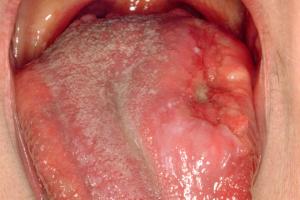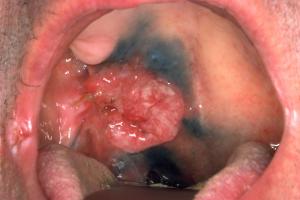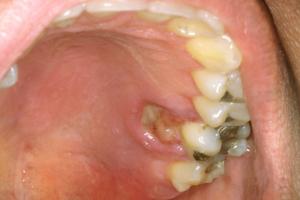Mouth cancer (oral cancer)
Mouth cancer is also known as oral cancer. Most cases occur in older adults aged 50 to 74. See your GP or dentist if you have symptoms that don't heal within three weeks, particularly if you drink or smoke heavily.
About mouth cancer
Mouth cancer can develop in most parts of the mouth, including the lips, gums and occasionally the throat.


Tumours can also develop in:
- the glands that produce saliva
- the tonsils at the back of the mouth
- the part of the throat connecting your mouth to your windpipe (pharynx) -these are less common
Symptoms of mouth cancer
Symptoms of mouth cancer include:
- sore mouth ulcers that don't heal within several weeks
- unexplained, persistent lumps in the mouth that don't go away
- unexplained, persistent lumps in the neck that don't go away
- unexplained looseness of teeth, or sockets that don't heal after extractions
- unexplained, persistent numbness or an odd feeling on the lip or tongue
- sometimes, white or red patches on the lining of the mouth or tongue – these can be early signs of cancer, so they should also be investigated
- changes in speech, such as a lisp

When to seek medical advice
You should see your GP or dentist if the symptoms above don't heal within three weeks, particularly if you drink or smoke heavily.
Causes of mouth cancer
Things that increase your risk of developing mouth cancer include:
- smoking or using other forms of tobacco
- drinking alcohol – people who drink and smoke heavily have a much higher risk compared with the population at large
- infection with the human papilloma virus (HPV) – HPV is the virus that causes genital warts
Treating mouth cancer
There are three main treatment options for mouth cancer:
- surgery – where the cancerous cells are surgically removed, along with a tiny bit of the surrounding normal tissue or cells to make sure the cancer is completely removed
- radiotherapy – where high-energy X-rays are used to kill cancerous cells
- chemotherapy – where powerful medications are used to kill cancerous cells
These treatments are often used together The health professional looking after your care will discuss treatment options with you.
Preventing mouth cancer
The three most effective ways of preventing mouth cancer developing, or preventing it coming back after successful treatment, are:
- not smoking
- ensuring you don't drink more than the recommended weekly limits for alcohol
- eating a healthy diet that includes plenty of fresh vegetables, citrus fruits, olive oil and fish
It is recommended you drink no more than 14 units of alcohol a week. If you drink as much as 14 units a week, it's best to spread it evenly over three or more days.
It's also important that you have regular dental check-ups. Dentists can often spot the early stages of mouth cancer.
Who's affected by mouth cancer
About two of every three cases of mouth cancer in Northern Ireland occur in older adults aged 50 to 74.
Around one in eight cases affect people younger than 50.
Mouth cancer can occur in younger adults. HPV infection is thought to be associated with the majority of cases that occur in younger people.
Cancer of the mouth is also more common in men than in women.
Outlook
If mouth cancer is diagnosed early, a cure is often possible in up to 90 per cent of cases using surgery alone.
In cases where the cancer is larger, there's still quite a good chance of a cure.
But surgery should be followed by radiotherapy or a combination of radiotherapy and chemotherapy to give the best chance.
Overall, about 51 per cent of people with mouth cancer in Northern Ireland will live at least five years after their diagnosis. Many will live much longer without the cancer returning.
Living with mouth cancer
It's not always easy to talk about cancer, either for you or your family and friends.
Being open about how you feel and what your family and friends can do to help may put them at ease.
If you have questions, your GP or nurse may be able to reassure you. You may find it helpful to talk to a trained counsellor or psychologist, or someone at a specialist helpline. Your GP surgery will have information about these.
Head and neck cancers
Mouth cancer is a type of cancer that comes under the umbrella term ’cancers of the head and neck’.
Other types of head and neck cancer include:
- cancer of the larynx – the voice box
- cancer of the nasopharynx – the area at the very back of the nose that forms the top part of the pharynx, or throat
- cancer of the oropharynx – the part of the throat that lies directly behind the mouth
- cancer of the hypopharynx – the part of the throat that lies directly behind the larynx
- cancer of the thyroid gland – a gland located on either side of the windpipe
- cancer of the nose and sinuses
- cancer of the oesophagus – the gullet
More useful links
- Northern Ireland Cancer Network
- Action Cancer
- Marie Curie
- Cancer Focus Northern Ireland
- Macmillan Cancer Support
- Cancer Research UK
The information on this page has been adapted from original content from the NHS website.
For further information see terms and conditions.